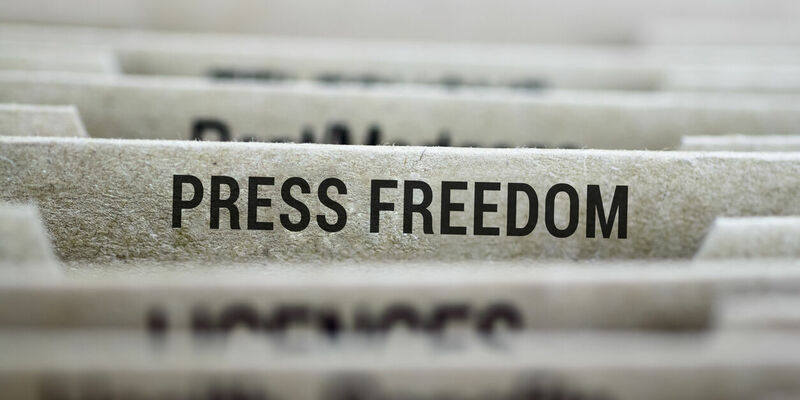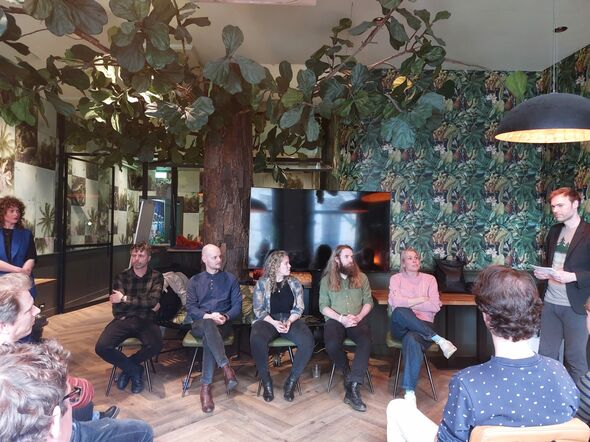
- The University , People
- 21/03/2024
Why are higher education media so important and why do they need to be independent? In Utrecht, five panel members are sitting in a row, facing an audience of stakeholders. About half the room works for the higher education media; other attendees include editorial board members and freelancers.
The panel members have been invited by journalist union NVJ and association for science journalism VWN, who have identified a “worrying trend”. They are sounding the alarm following a series of incidents in which the freedom of press in higher education have come under pressure.
Watchdog
Social scientist Linda Duits, who − amongst other things − wrote columns for Amsterdam university magazine Folia, kicks things off. Universities are big, powerful institutes and participation councils and independent media used to be able to keep them in check. “That’s all come crumbling down”, she asserts. “Journalism must serve as a watchdog, but you can only be a watchdog if you’re not being paid by your master, because then you won’t bite.” She says it’s an “unhealthy, dictatorial construction”.
There are countless examples. In Eindhoven, the university magazine’s website blacked out when the publication of an article about the rector’s conflict of interests was prevented and the editor-in-chief was sidelined. This even landed editor Bridget Spoor, one of the panel members, in a whistleblowing case.
Several media at universities of applied sciences have also had to fight for their freedom. The Rotterdam magazine Profielen was recently embedded into the communications department. We would have preferred not to make this switch, the editor-in-chief wrote in a commentary. Before that, an incident at HAN University of Applied Sciences had made the national news. An interim manager at the communications department was frustrated with a column on ‘bullshit jobs’ and had his own response placed above that column on the website.
Less pessimistic
“We’re paid by the university, so that’s something we have to deal with”, acknowledges Willem Andrée, editor-in-chief of Wageningen university magazine Resource. “You have to be fortunate enough that the board understands the university needs a thorn in its side.” He believes this is the case in Wageningen.
Financial dependence doesn’t have to be a problem, says editor-in-chief Ries Agterberg of Utrecht-based DUB, who’s in the audience. Above all, you must properly arrange things. “The national news is also funded by the government.”
Agterberg also disagrees that things are that bad: “I am somewhat less pessimistic.” If anything, recently there have been all kinds of great examples of science journalism in higher education. Take Delta, which demonstrated how Delft University of Technology is inadvertently collaborating with the Chinese army. Or Ad Valvas, which discovered everything that was going wrong at the psychology faculty.
“I’m not entirely dissatisfied either”, says editor-in-chief of Delta Saskia Bonger. “It’s difficult at times, but that’s also kind of fun.” You can’t really complain about administrators dodging questions sometimes, she says, because they all do that.
Reputation manager
And yet, sometimes things go wrong. Editor Bridget Spoor (Cursor) hasn’t felt independent, she says. A triptych on social safety turned into a diptych, because the third part was censored. And the editorial board that was to support them? “The chairperson was a reputation manager”, says Spoor. The room is filled with booming laughter.
The danger of self-censorship is always lurking, but that’s not only the case in higher education. One of the moderators, science journalist Ronald Veldhuizen, mentions articles about farmers or motorcycle gangs. It’s tempting to be a bit more cautious, is what he means.
Good statutes
What needs to be done? Independence needs to be guaranteed, for example through good statutes and expert editorial boards. It’s okay for full professors to be on those, Mark Reid of Leiden’s university magazine Mare believes. They would dare to push back when the board is being difficult.
Things should be arranged by law, says Linda Duits. Administrators will always say they attach importance to independence, but according to her you shouldn’t blindly trust such statements.
And don’t forget about distribution. The magazines used to be on the stands everywhere, but nowadays a lot are exclusively online. Duits thinks this is also a type of censorship, especially if the news isn’t sent to students and staff.
Solidarity
Editor of Erasmus Magazine Elmer Smaling thinks editorial teams should also show more solidarity amongst each other. When Cursor blacked out, all other websites in higher education could have also blacked out their sites, he says. “But we couldn’t get enough support for this.”
The media can defend themselves together, says editor-in-chief Paul Disco of HvanA, the magazine of Amsterdam University of Applied Sciences. “Everything is insured at higher education institutions, except their reputations.” He’s been called to account before and doesn’t mind this all that much. But when freedom is truly at stake, media could be quicker to join forces “so a real problem is created for such a board”.
Incidentally, in higher education there’s a Circle of Editors-in-chief, which protects the interests of higher education media. It is chaired by Willem Andrée (Resource). The circle sent a critical letter to Eindhoven University of Technology when the conflict with the editorial team arose there.
Press officer
These weren’t the only themes, ideas and insights that were discussed. There was hardly any discord: there were no administrators in the room and only one press officer. His main complaint: journalists sometimes copy his press releases verbatim and sign them with their own names.
NVJ and VWN won’t let the issue rest for now. The union is investigating the statutes and wants to support the editorial teams in their independence. The Circle of Editors-in-chief is also scrutinising the statutes.

Discussion